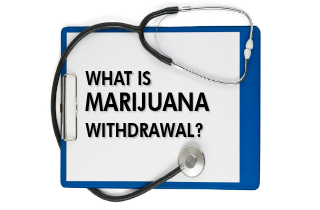Does marijuana withdrawal really occur? Yes. In fact, marijuana withdrawal is a well documented medical condition. What are symptoms of marijuana withdrawal and what can be done about them? We review here. Then, we invite your questions about withdrawal from marijuana and helping marijuana addiction at the end.
What is marijuana withdrawal syndrome?
Before getting to the symptoms of marijuana withdrawal, it is useful to understand the principle of drug dependence. Using marijuana on a regular basis leads to physical dependence on the main psychoactive ingredient in marijuana, tetrahydrocannabinol (THC). After developing dependence, the brain gets used to having THC present in the central nervous system and adapts functions to accommodate the chemical mix. When this happens, the brain will actually alter some of its functions to compensate for the effects of the drug and to maintain a delicate balance known as homeostasis. Eventually, the brain becomes so normalized to the presence of THC that it needs THC to function normally.
When marijuana become unavailable, the body and brain struggle to maintain homeostasis, often unsuccessfully. This manifests into marijuana withdrawal syndrome as the brain and body try to get used to functioning without the drug again. Marijuana withdrawal syndrome is characterized by several physical and psychological symptoms.
What is withdrawal from marijuana like?
The intensity and length of withdrawal from marijuana is different for everyone. In fact, some individuals may never experience any withdrawal symptoms at all. However, those who do experience marijuana withdrawal typically find the experience uncomfortable and much like an extreme dissatisfaction with everything. The symptoms associated with marijuana withdrawal are often psychological or mood based, although physical symptoms can make you feel drowsy, irritable, and fatigued.
What does marijuana withdrawal feel like?
As mentioned before, marijuana withdrawal can feel differently for everyone, but there are some symptoms that are very common. Symptoms of marijuana withdrawal generally begin several hours to a couple days after last use. Depending on the individual and the severity of the addiction, marijuana withdrawal symptoms can last one to four weeks. Some of the more common marijuana withdrawal symptoms include:
- agitation
- anxiety
- headaches
- intense cravings for marijuana
- nausea
- poor appetite
- restlessness
- sleep problems
What helps marijuana withdrawal?
Detoxification from marijuana can be difficult, especially if you’re a long time, heavy user. To minimize the withdrawal symptoms, you should consider tapering your usage, or gradually reducing the amount or frequency that you use the drug. For instance, you can cut your marijuana usage by a small percentage each day until you aren’t using it at all. While you may still experience some withdrawal symptoms, they shouldn’t be severe.
Most medical experts recommend that individuals going through an especially difficult marijuana withdrawal seek professional medical help. There are a number of different options available, including inpatient and outpatient detox services in hospitals and rehabilitation centers. Along with general support and medical monitoring, detox centers can also help patients manage their physical withdrawal symptoms.
Some patients may find that their marijuana withdrawal symptoms are extremely uncomfortable. To help manage them, doctors at rehabilitation centers may administer certain medications. Synthetic tetrahydrocannabinol (THC), which is the primary psychoactive component in marijuana, is often very successful in alleviating marijuana withdrawal symptoms. It is most commonly administered orally, but a THC patch – similar to a nicotine patch – may be developed soon.
If you won’t be going under marijuana detox under medical supervision, there are also a number of home remedies that you can use to alleviate marijuana withdrawal symptoms. Anxiety and aggravation, for instance, can be relieved using stress reduction techniques, such as exercising or breathing exercises. Gastrointestinal symptoms can be relieved with over-the-counter stomach medicines, and you should also drink plenty of water to help flush the toxins from your body. Eliminating caffeine and using herbal teas can also help with sleep problems.
Questions about marijuana withdrawal
Going through marijuana withdrawal can be frustrating and difficult, particularly if you’re going through it alone. Keep in mind, however, that you don’t have to go through this difficult time alone. If you have any questions or concerns about your situation or a loved one’s, feel free to leave a comment below. We’ll try our best to answer your questions personally and promptly and point you in the right direction.









Related Posts